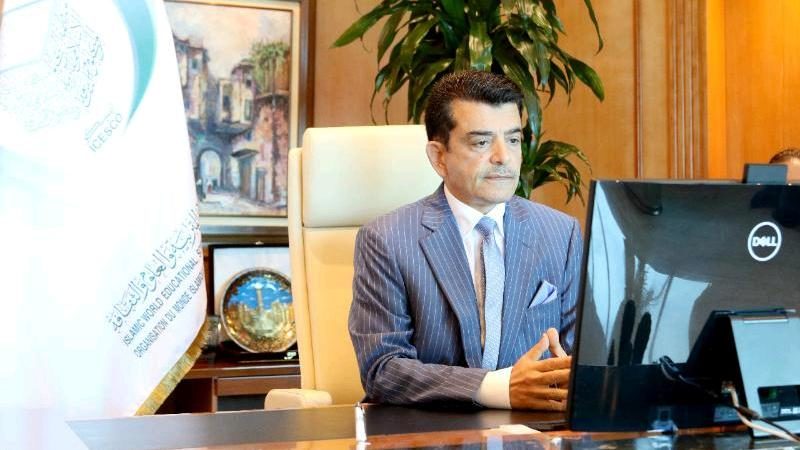
AlMalik to the Extraordinary Conference of Culture Ministers: ICESCO strives to develop the relationship between culture, tourism, and sports

17 June 2020
Dr. Salim M. AlMalik, Director-General of the Islamic World Educational, Scientific and Cultural Organization (ICESCO), reaffirmed that digital culture is the new face of future cultural action, adding that this makes it imperative to adopt a firm working method to sustain the cultural action, develop cultural tourism and empower the sporting culture by using AI applications in cultural action and making recourse to innovators in these fields.
This was an excerpt from Dr. AlMalik’s address at the opening session of the Extraordinary Virtual Conference of Culture Ministers of Member States of ICESCO, held today under the presidency of the State of the Unit Arab Emirates, under the theme “Sustainability of cultural action in the face of crises (Covid-19)”, with the participation of 50 countries and 22 international organizations.
In the same vein, Dr. AlMalik stated that ICESCO’s call to hold this Extraordinary Conference of Culture Ministers emanates from the responsibility assumed by all Member States in supporting the cultural policies and programmes, and from ICESCO’s position as a house of expertise and an open institutional space for dialogue and the dissemination of successful experiences and innovative solutions for cultural action management. “ICESCO is also the competent party in charge of coordinating the joint cultural action, which requires developing a global cultural project likely to ensure the right to culture, keep up with future changes and its ties with vital sectors such as tourism and sports, and open new prospects for promoting the values and mechanisms of intercultural and inter-civilizational dialogue,” he stressed.
Besides, ICESCO Director-General said that culture is a cornerstone for building the human future and civilization. There is a need to develop a robust cultural capital likely to contribute to the efforts in facing future cultural challenges. Against this backdrop, the Conference chooses the topics to be discussed during its session, including the significant cultural problems during crises; anticipating the future of culture after Covid-19 crisis; exploring the new trends of cultural tourism; publicizing the Digital Strategic Cultural Project, prepared by ICESCO as a basis for future joint cultural action for the Member States; and, the Portal of Islamic World Heritage, established by ICESCO based on the rich Islamic World heritage, of which 80% is endangered. This Portal will help inscribe the heritage sites and intangible heritage elements on the Islamic World Heritage List.
Moreover, Dr. AlMalik underscored that the concept of cultural tourism, which was adopted by the United Nations 57 years ago, requires promotion to put culture, tourism, and sports back in the forefront of States economies, stressing that the relationship between culture and sports is worthy of development given their rich activities, and highlighting that ICESCO is honored to explore new prospects in this field which will hopefully yield further results very soon.
Dr. AlMalik also stated that the distance cultural programmes during the lockdown period mitigated the psychosocial distress, and reduced the repercussions caused by the closure of over 95% of cultural institutions while commending the leading initiatives launched by ICESCO during these exceptional circumstances, most notably “ICESCO Digital Home,” which is knowledge, cultural, educational and scientific platform that received great interest through its programme “Distance Culture” and initiatives “Comprehensive Humanitarian Coalition” and “The Societies We Need”.
In closing, Dr. AlMalik stressed that the current global transitions in various fields make it imperative for the Member States to proactively lead the march of the new cultural movement with confidence and foresight ability to build a bright future and safe societies.



